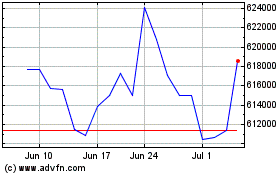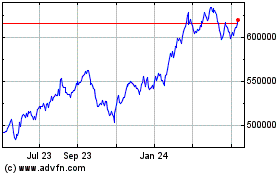By Anupreeta Das
Ed Prendeville was driving through Omaha, Neb., one winter night
in 1981 when he recalled that Warren Buffett, an investor he had
read about in college, lived in the Midwestern town.
He made a mental note, and two years later the trader of
collectible toy trains had scraped together enough to buy his first
shares of Berkshire Hathaway Inc. for $1,300 apiece. Mr.
Prendeville has been reaping the rewards of that decision ever
since.
"It's my security blanket," the 64-year-old said of the shares,
some of which now trade at over $200,000 each.
In 50 years at the helm of Berkshire, Mr. Buffett has
transformed a struggling textile mill into a massive holding
company with $200 billion in revenue and created a legion of
unlikely millionaires--and even a few billionaires.
One of those shareholders is "Forty-Dollar Frank"--Frank
Fitzpatrick, a Lake Tahoe, Nev., tax lawyer who occasionally
introduces himself that way because he bought his first Berkshire
shares for $40.
Mr. Fitzpatrick recalls buying about 200 shares in early 1976 at
that price, only to sell them 14 months later after they had
doubled. As the stock continued to soar, he regretted the move and
bought back in at an even higher price. Since then, "I've always
had a habit of running back to Berkshire," Mr. Fitzpatrick
said.
In 1995, after he bought his lakefront home in Tahoe, Mr.
Fitzpatrick said his family gathered on the deck "for a group hug
and said, 'Thank you, Warren.'" Although he has used Berkshire
shares to fund an education nonprofit, the 72-year-old says his
remaining Berkshire shares will go to his two children.
Early Berkshire stockholders have used shares to finance
children's educations, buy homes and put up collateral for loans.
Hundreds of millions of dollars of stock already have gone to
shareholders' alma maters, employers, cultural institutions and
medical research.
As those longtime investors age along with Mr. Buffett, who is
85, they too are grappling with how best to pass it on. Mr. Buffett
has pledged to donate almost all of his $62 billion fortune to
charity and has already given away more than $25 billion. In an
interview, he said he expects a "high percentage of big individual
shareholders" will do the same.
The Berkshire chairman holds uncommon sway over shareholders of
his company, and his influence helps explain how many of them view
their wealth.
The billionaire has lived in the same house that he purchased in
1958 for $31,500. He often picks up breakfast for a couple of
dollars at a McDonald's near his office and pays himself a salary
of $100,000. He frequently drives himself around town in his
Cadillac sedan.
Like Mr. Buffett, Berkshire shareholders are an unusual bunch.
Every spring, tens of thousands of them, from money managers and
corporate executives to farmers and rabbis, descend on Omaha for
Berkshire's annual meeting, where their quirks are in full
display.
At an annual dinner organized by a small group of shareholders
on the sidelines of the meeting, the restaurant bill is usually
split multiple ways. Omaha bartenders and waitresses say Berkshire
shareholders are stingy tippers.
Mr. Buffett used to keep track of all his shareholders before
they swelled into the tens of thousands. Beginning in the 1970s, as
Mr. Buffett's renown began to grow, so did Berkshire's shareholder
base.
There are hundreds of Berkshire millionaires in the Portland,
Ore., area alone thanks to a money manager there who had the
foresight to scoop up shares on behalf of clients in the 1970s.
The money manager, Mark Holloway, discovered Mr. Buffett in the
early 1970s after Ben Graham, a legendary value investor who was
Mr. Buffett's mentor, recommended that they meet. Mr. Buffett
didn't have time, but Mr. Holloway said he began buying shares for
himself and for clients of his firm.
Clients paid prices as low as about $400 a share and on average
received fewer than a dozen each. Today, a few hundred are
millionaires in the Portland area, said Mr. Holloway, who manages
about $50 million of his own and clients' money.
Shareholders who want to sell their shares are staring at a huge
tax hit given the stock's enormous rise in value. Charitable
donations, meanwhile, are tax-free and deductible from federal
estate taxes.
"Philanthropy is a smart way out as well as the good way out,"
said Andy Kilpatrick, the author of a 1,286-page book on
Berkshire.
Jim Halperin, a Dallas shareholder who founded a rare-coin
auction company, bought his first Berkshire shares in 1995 when
they were trading around $30,000. His holdings are now worth about
$19 million.
Mr. Halperin, 62, said his views on philanthropy were reaffirmed
by Mr. Buffett's move in 2006 to donate most of his fortune
primarily to a foundation run by Microsoft Corp. co-founder Bill
Gates. Mr. Halperin said he donates about a quarter of his earnings
each year to local causes, and that he and his wife plan to give
most of their millions away.
In March, Omaha residents Bill and Ruth Scott joined the Giving
Pledge, an effort by Messrs. Gates and Buffett to urge the world's
billionaires to give at least half their fortunes to charity during
their lifetimes.
Mr. Scott was the first employee of Mr. Buffett's investment
partnership in the early 1960s and spent his career at Berkshire,
accumulating enough stock to become very wealthy. "Ruth, a farm
girl, likes to compare a 'pile of money' to a 'pile of manure,'"
the Scotts wrote Mr. Buffett. "Neither one does much good unless
you spread it around!"
Mr. Prendeville, who bought Berkshire stock after driving
through Omaha, lives in New Jersey and makes a living buying and
selling collectible trains, said that as profits at his
Parsippany-based business grew, he invested nearly every cent in
Berkshire stock. He put some in accounts for his children and some
in a retirement account for himself. His two sons grew up indulging
their passion for race-car driving, an expensive hobby Mr.
Prendeville might not otherwise have been able to support. His
Hyundai sports a sticker that reads "In Berkshire Hathaway We
Trust."
In 2007, he was diagnosed with colorectal cancer. Without his
Berkshire shares, Mr. Prendeville said it would have been hard to
pay for cutting-edge treatment that his insurer refused to cover.
"I was able to write a check," he said.
Mr. Prendeville--who once found Mr. Buffett a toy train set
modeled after the Midwestern Hiawatha train that the billionaire
coveted as a child--said he is now turning to estate planning. He
has no plans to start a foundation of his own but said he is
struggling to figure it out.
"Where is one dollar of mine going to make the most difference?"
he said. "It's not easy."
Subscribe to WSJ: http://online.wsj.com?mod=djnwires
(END) Dow Jones Newswires
October 21, 2015 05:44 ET (09:44 GMT)
Copyright (c) 2015 Dow Jones & Company, Inc.
Berkshire Hathaway (NYSE:BRK.A)
Historical Stock Chart
From Mar 2024 to Apr 2024

Berkshire Hathaway (NYSE:BRK.A)
Historical Stock Chart
From Apr 2023 to Apr 2024
